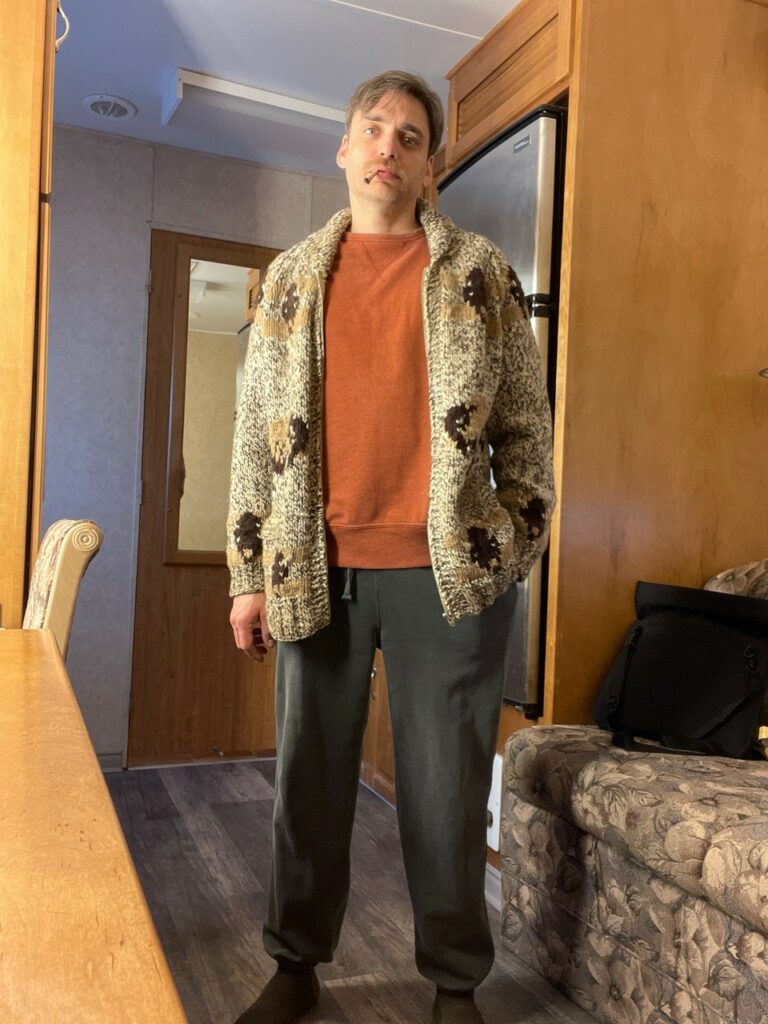
When and how did you start in the media production industry?
I enrolled in an acting class in late 2011 and landed my first paid gig – a CAA Manitoba commercial, with a total of 1.2 seconds of screen time (I counted) and no lines – in January 2012. I count that as my ‘start’.
What area of the film industry do you work in now and why?
I’m an actor. Why? Cause people keep paying me to do it. [knocking wood]
What has been a substantial change in the industry since you started?
I’m lucky enough to have a handful of friends who make their entire (and sustainable) living on their film/TV acting income. That kind of success was virtually unheard of in Winnipeg as recently as five years ago. Until then, either you needed a second (or third) job, or you supplemented your income with theatre or crew work in film (which, for the record, has its own benefits for actors).
Today, the list of professional actors based in Winnipeg and supporting themselves entirely on acting income is short. But it’s a list. And it seems to be growing.
If you could give yourself advice today to yourself in the past, what would it be?

I would tell first-year-university-me not to listen to the theatre professor who made me feel like such a bad actor that I abandoned the pursuit for the next 15 years.
Look, I don’t have regrets, as a policy. And things are working out well now. And I probably benefited by launching my acting career once I had the maturity to handle it.
But I sometimes wonder where I’d be today if my runway was 15 years longer…
What advice would you give to someone starting off in the media production industry?
If they’re looking to work in crew? I’d tell them we need them, in all departments and at all levels. And given the volume of production we’re doing and the size of Manitoba’s film labour force, they have an incredible opportunity to fast-track their learning and career by starting here.
If they want to be an actor? There’s a common adage about actors having three jobs: be on time, know your lines, and hit your mark. I’d heard that advice for years and liked it for its blue-collar nature. But it changed for me recently when I heard a podcast where Tom Hanks was the guest, and he added a fourth job…
Have an idea.
That clicked for me. Just being there, saying the words, finding your light and the lens isn’t enough. That’s all essential. But it’s table stakes.
Your job isn’t done if you don’t have an idea. Make a choice. Hell, make a few. Do something beyond the bare minimum.
And, more importantly, be prepared to let your idea go. The director might not like it. It might not work for the camera. It might conflict with rewrites. Or it might just stink.
But the care, consideration and effort you put into developing an idea will prepare you to receive ideas that your crewmates and castmates will (or at least should) also have. So you’re not caught off guard when you get a redirect. Or when a line changes. Or the blocking isn’t what you envisioned in your trailer.
For me, having an idea (or not) is what makes us artists… (Or not).
Be an artist. Have an idea.
What are some of the films, TV series or even books that have inspired you? How about anything new you’ve been into?
I watch a lot of TV. Barry’s incredible. The Handmaid’s Tale is unnervingly prescient. I rewatch 30 Rock, The Office (US), and How I Met Your Mother from start to finish at least once a year. I can’t believe people aren’t still talking about Severance every damn day.
And Fleabag is the single best television series ever made. Fight me.
Is there something about you or an interesting past experience that you’d like to share with your colleagues?

I recently started leading an audition techniques class out of The Abby (a casting studio in Winnipeg, for those FTM readers not familiar). I focus on helping actors make stronger choices so they can deliver stronger auditions more consistently. People seem to enjoy it, so I’ll likely do more in 2024.
Why is learning and training important?
Because no matter how smart or clever or talented you are, when you open yourself up to the alchemy of sharing and combining your ideas with others, you and your work will be at least incrementally better. And better is always the goal.
Is there someone within the film industry you would like to work with and why?
This is going to sound sycophantic, but it was Paul Rabliauskas – the creator, showrunner and star of Acting Good (#1 show on CTV Comedy, bay-bee).
When the show was announced to be moving into production, I said to anyone who’d listen I need to be on that. There wasn’t a breakdown yet, just a logline/synopsis via a media release. But what I knew from that limited information was it was going to be set in Manitoba, it was going to be a comedy, and it was going to feature a primarily Indigenous cast.
I’m hardly the best person to speak on this – but in my opinion, one of the adverse impacts in the industry’s (slow and clumsy and too often tokenized) move toward diversity is that underrepresented communities are still featured mostly through their trauma. And here was this Indigenous-centred show – set on a reserve – and it was going to be funny, absurd, and joyful? Sign. Me. Up. Whatever I could do to lend to the show’s success, I wanted to do.
I would have been happy to do a single guest spot on one episode of Paul’s show. I’m extremely fortunate that he and the team liked my take enough that my character Greg recurs in seasons 1 and 2.
So, yeah. Paul.
And also, let’s say…
The Rock. Not because I like him, especially. He’s fine. But because, like, everyone watches whatever he’s in. That’d be cool, right?
Where do you see yourself ten years from now?
God willing, still working… and still being asked to read for roles much younger than my actual age. A boy can dream.
FTM is a non-for-profit charity and member of the Province of Manitoba’s sector council program (through the Department of Economic Development and Jobs). FTM conducts workforce development and training to build a highly skilled and adaptable film industry to support the activities of Manitoba production companies. FTM collaborates with members of the film and television industry to identify the training needs within the community.
